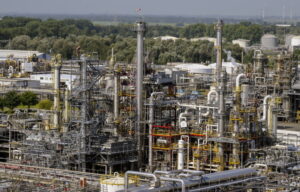The deep crisis in the German heavy industry is taking on a domino effect, and the very foundations of the German economic miracle, as it was built post-war, are literally shaking. Next in line is the German industry Evonik, headquartered in Essen, in the Ruhr Valley, the traditional “cradle” of German heavy industry in the most populous state of North Rhine-Westphalia.
According to its CEO, Christian Kullmann, the company is planning a radical restructuring, which may affect around 7,000 jobs, with about 2,000 layoffs being considered possible. The goal is to make the structure more flexible and competitive, while the blows suffered by the German chemical industry in recent years, a key pillar of the German economy, were severe, especially after the interruption of the flow of cheap Russian natural gas from Russia to Germany and the ensuing energy crisis.
The German Chemical Industry Association reports, based on official figures, that significant players in both the chemical and pharmaceutical industries in Germany are experiencing an unprecedented recession, with numerous units closing or leading to cuts in positions and wages.
Negative forecasts from the Bundesbank
At the same time, just a few weeks before the year’s end, the Federal Bank of Germany is revising its growth forecasts for Germany downward and notes that the stagnation phase it has entered will last longer than initially expected. They even forecast weak economic growth starting only in 2026.
Specifically, Bundesbank experts, as pointed out by German radio DLF, predict a growth of just 0.2% instead of 1.1% for 2025 and 0.8% instead of 1.4% for 2026. The head of the Bundesbank, Joachim Nagel, believes that the main reasons are not only persistent economic problems in many sectors of the German economy but also chronic structural malfunctions.
Decline in German exports
At the same time, negative forecasts also concern the outlook for private consumption in Germany, which, according to the Federal Bank, is not expected to become an immediate driving force for recovery. Although inflation has significantly decreased compared to 2022 and the first year of the war in Ukraine, prices for food and services remain high.
According to the Federal Statistical Office, German exports fell by 2.8% compared to the previous month, now amounting to 144 billion euros. Exports to the USA, in particular, decreased by 14%, while the USA remains the most important market for German products.
Ask me anything
Explore related questions





